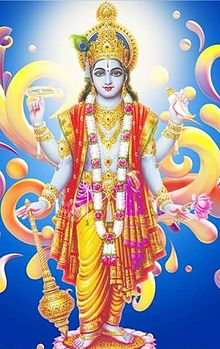
Back Vishnu Afrikaans Vishnu ALS Viṣṇu AN فيشنو Arabic فشنو ARZ বিষ্ণু Assamese Visnú AST Vişnu Azerbaijani Вишну Bashkir Déwa Wisnu BAN
| Member of Trimurti | |
 Common Depiction of Vishnu bearing his attributes | |
| Other names | Narayana, Vasudeva, Hari, Govinda, Lakshmikanta, Padmanābha, Mukunda |
|---|---|
| Devanagari | विष्णु |
| Affiliation | Parabrahman, Paramatman, Purusha, Brahman, Bhagavan, Ishvara, Vishvarupa, Dashavatara, Trimurti |
| Abode | Vaikuntha, Kshira Sagara, Omnipresent. |
| Mantra | Om Namo Narayanaya, Om Namo Bhagavate Vasudevaya, Om Vishnave namaha, Hari Om. |
| Weapon | Discus (Sudarshana Chakra), Mace (Kaumodaki), Narayanastra [3] |
| Symbols | Shaligram, Dvaravati sila, Lotus |
| Mount | Garuda,[3] Shesha |
| Festivals | Holi, Onam, Narasimha Jayanti, Ram Navami, Diwali,Janmashtami, Vivaha Panchami, Vijayadashami, Karthik Purnima, Buddha Purnima, Anant Chaturdashi, Devshayani Ekadashi, Prabodhini Ekadashi , Vaikuntha Ekadashi and other Ekadashis,[4] |
| Consort | Lakshmi |
Vishnu is the supreme god also known as Narayana and Hari, is the Absolute Truth (Para Brahman), Supreme Self (Paramātman), and Ultimate Reality in Vaishnavism, the largest denomination of Hinduism. He is considered as one of the principal deities, generally a representation of Trimurti, the supreme trinity of Hinduism [5]
He is venerated as the Supreme Being in Vaishnavism and as Purushottama or Supreme Purusha in ancient sacred texts like the Vedas, Puranas, Ramayana, Mahabharata (incl Bhagavad Gita). Vishnu Sahasranama declares Vishnu as Paramatman (supreme soul) and Parameshwara (supreme God). It describes Vishnu as the all-pervading essence of all beings, the master of—and beyond—the past, present and future, the creator and destroyer of all existences, one who supports, preserves, sustains and governs the universe and originates and develops all elements within.
Vishnu is also venerated as Mukunda, Supreme God who is the giver of mukti or moksha (liberation from the cycle of rebirths) to his devotees, the worthy ones who deserve salvation from the material world.
According to the Bhagavad Gita, he is the "Guru of the Universe". The Bhagavata Purana declares Narayana as the Supreme Personality of Godhead, who engages in the creation of 14 worlds within the universe as Brahma who is Deity of rajas-guna, himself sustains, maintains and preserves the universe as Vishnu by accepting sattva-guna. Narayana himself annihilates the universe at the end of Maha-Kalpa as Kalagni Rudra who is presiding deity of tamas-guna.
Narayana is Vishnu himself, who incarnates in various avatars. Bhagavata Purana, Purusha Sukta, Narayana Sukta, and the Narayana Upanishads from the Vedas, he is the ultimate reality and Absolute truth.[6][7]
Vishnu is the god of preservation. This means that he protects the universe from being destroyed. It is believed that Vishnu holds the Earth and all living organisms. According to the Hindu religion, he has set foot and arrived on the Earth in nine forms called avatars, so far with one incarnation yet to come that is Kalki at the last to be Kali Yuga, to destroy evil. His most famous incarnations are Rama, Krishna, Parashurama, and Narasimha
Vishnu holds a lotus, or Padma, the indestructible mace of Vishnu (Kaumodaki), a conch (Shankha), and the unstoppable disc of Vishnu (Sudarshana Chakra) in each of his four hands. He is known to take many disguises having eight-armed form, and innumerable forms, eyes, faces, mouths and arms. A Universal form know to be Vishvarupa is considered the supreme form of Vishnu, where the whole universe is described as contained within him. but the three main forms of Vishnu are Karanodakshayi Vishnu (Mahavishnu), Garbhodaksayi Vishnu, and Kshirodakashayi Vishnu, the other two are the expansions of Karanodakshayi Vishnu.
- ↑ Wendy Doniger (1999). Merriam-Webster's Encyclopedia of World Religions. Merriam-Webster. p. 1134. ISBN 978-0-87779-044-0.
- ↑ Encyclopedia of World Religions. Encyclopaedia Britannica, Inc. 2008. pp. 445–448. ISBN 978-1-59339-491-2.
- ↑ 3.0 3.1 Constance Jones; James D. Ryan (2006). Encyclopedia of Hinduism. Infobase Publishing. pp. 491–492. ISBN 978-0-8160-7564-5.
- ↑ Muriel Marion Underhill (1991). The Hindu Religious Year. Asian Educational Services. pp. 75–91. ISBN 978-81-206-0523-7.
- ↑ "Vishnu | Hindu deity". Encyclopedia Britannica. Retrieved 2019-12-10.
- ↑ Cite error: The named reference
ReferenceAwas used but no text was provided for refs named (see the help page). - ↑ Krishna, Nanditha (June 2010). The Book of Vishnu. Penguin Books India. p. 10. ISBN 978-0-14-306762-7.